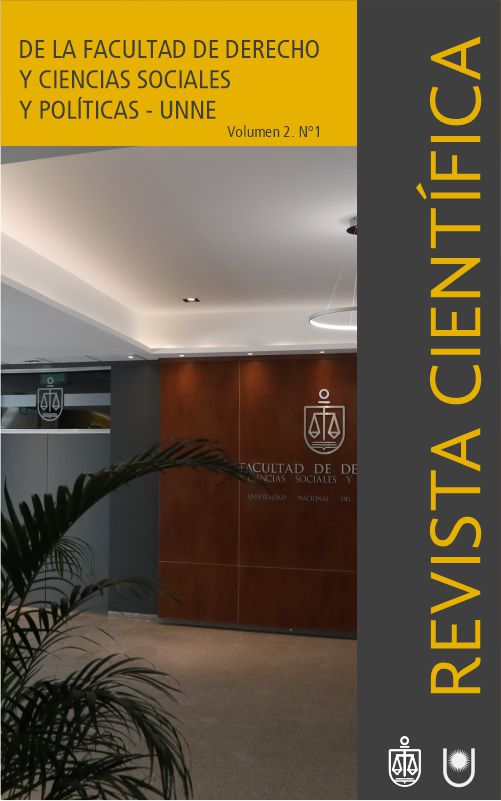Believing, evaluating, knowing: legitimacy and logic in Max Weber’s study of law
DOI:
https://doi.org/10.30972/rcd.216618Keywords:
Max Weber, development of logic in history, legal knowledge, evidence-based concepts, legitimacyAbstract
This article presents a discussion on the
relationship between the development of
sociology, legal sciences, logic, ethics and
history in relation to human action and its
interpretation in Max Weber’s neo-Kantian
theory. The methodology adopted is based
on the review of texts by Weber and oth-
er relevant authors in political, legal and
knowledge theory. Key ideas include a
re-reading of the formation of the cogni-
tive processes that gave rise to the different
forms of the legal order in human history,
beyond prescriptive notions that rely on an
absolute and indisputable authority for the
formation of the social order (God, “uni-
versal laws”, the “absolute spirit”). Among
these interpretations is that of Weber, who
attributes prominence to the charismatic
hero as a figure in human history that gen-
erates social cohesion. It is contextualized
that, although there is a similar logic be-
tween this idea and that of National Social-
ism, he cannot be accused of the emergence
and positioning of a project towards which
he expressed political and personal discrep-
ancies. On the contrary, it invites to analyze
the pre-categorical structure in Weber’s
logic, its social and historical environment
and how this logic must be questioned in its
bases and inferences in order to reformulate
a new worldview on social, individual and
juridical development. In conclusion, the
paper highlights the application of criteria
to evaluate the underlying logics of any
theory, including legal theory, by reviewing
the reasoning in each of the fields. It also
suggests differentiating concepts based on
value judgments masked under the aspect
of universal notions, and invites the con-
struction of solid bases, through the anal-
ysis of empirical evidence, to refine, thus,
the instruments used in the analysis of the
cognitive dimension of legal sciences.
References
Almond, G. A. (1969). Almond: Politische Systeme und politischer Wandel. En W. Zapf (Ed.), Theorien des sozialen Wandels. Kiepenheuer & Witsch.
Cassirer, E. (1969). Substanzbegriff und funktionsbegriff von cassirer. Wissenschaftliche Buchgesellschaft. https://www.zvab.com/buch-suchen/titel/substanzbegriff-und-funktionsbegriff/autor/cassirer/
Dux, G., & Luckmann, T. (Eds.). (1973). Gegenstand und Methode. En Sachlichkeit: Festschrift zum 80. Geburtstag von Helmuth Plessner. VS Verlag für Sozialwissenschaften.
Hauser, R. (1968). Norm, Recht Und Staat: Berlegungen Zu Hans Kelsens Theorie Der Reinen Rechtslehre: 6. Springer Verlag GmbH.
Henrich, D. (1952). Die Einheit der Wissenschaftslehre Max Webers. Mohr.
Hoebel, E. A. (1954). The Law of Primitive Man. Harvard University Press.
Kaufmann, A. (1965). Die ontologische Struktur des Rechts, Die Ontologische Begründung des Rechts. Wissenschaftliche Buchgesellschaft. Darmstadt.p. 506.
Kelsen, H. (1982). Teoría pura del derecho (R. J. Vernengo, Trad.). Universidad Nacional Autónoma de México, Instituto de Investigaciones Jurídicas.
Larenz, K., & Canaris, C.-W. (1995). Methodenlehre der Rechtswissenschaft. Springer. https://doi.org/10.1007/978-3-662-08709-1
Loewenstein, K. (1961). Max Weber als «Ahnherr» des plebiszitären Führerstaates. Kölner Zeitschrift für Soziologie und Sozialpsychologie, 13, 275-289.
Loos, F. (1970). Zur Wert- Und Rechtslehre Max Webers. Mohr.
Macpherson, C. B. (1973). Die politische Theorie des Besitzindividualismus. Suhrkamp.
Mayer, C. (1974). Die Marx-Interpretation von Max Weber. Soziale Welt, 25(3), 265-277. https://www.jstor.org/stable/40877136
Marcic, R. (1965). Um eine Grundlegung des Rechts: existentiale und fundamentalontologische Elemente im Rechtsdenken der Gegenwart. na. p. 514.
Mommsen, W. J. (1959). Max Weber und die deutsche Politik. Mohr.
Mommsen, W. J. (1963). Zum Begriff der plebiszitären Führerdemokratie’ bei Max Weber. Kölner Zeitschrift fur Soziologie und Sozialpsychologie, 15(2).
Nolte, E. (1963). Max Weber Vor Dem Faschismus. Der Staat, 2(1), 1-24. https://www.jstor.org/stable/43639288
Plessner, H. (1959). Die verspätete Nation. Suhrkamp.
Plessner, H. (1968) Der kategorische Konjunktiv, en: Verstehen und Vertrauen, Festschrift für Friedrich Bollnow zum 65. Geburtstag, Stuttgart.
Radbruch, G. (1956). Rechtsphilosophie. Stuttgart: Koehler. 100 p.
Rickert, H. (1928). Kulturwissenschaft und Naturwissenschaft. Celtis Verlag.
Max Rheinstein, Max Weber on Law in Economy and Society. Colección: Twentieth Century Legal Philosophy Series 6. Traducido por Edward A. Shils. Cambridge, M.A., EE.UU.: Harvard University Press. 363 p.
Schaaf, J.J. (1946) Geschichte und Begriff. Eine kritische Studie zur Geschichtsmetodologie von Ernst Troeltsch und Max Weber. Tûbingen. J.C.B. Mohr.
Schmitt, C. (1934). Politische Theologie: Vier Kapitel Zur Lehre Von Der Souveranitat. Dunker & Humblot.
Simmel, G. (1904). Einleitung in die Moralwissenschaft: Eine Kritik der ethischen Grundbegriffe. Wentworth Press.
Strauss, L. (2022). Naturrecht und Geschichte. Meiner, F.
Von Ferber, C. (1970). Die Gewalt in der Politik: Auseinandersetzung mit Max Weber. Kohlhammer.
Weber, M. (1903). Roscher und Knies und die logischen Probleme der historischen Nationalökonomie. Duncker & Humblot
Weber, M. (1904-1905) Die protestantische Ethik, Ges. Aufsätze z. Relig. Soz. Bd. I, pp. 11, 35, 61 seq. [hay trad. al español] Weber, M (2012) La ética protestante y el espíritu del capitalismo. México: Fondo de Cultura Económica. 587 p.
Weber, M. (1907). R. Stammlers «Ueberwindung» der materialistischen Geschichtsauffassung. A. Deichertsche Verlagsbuchhandlung.
Weber, M. (1926). Max Weber: Ein Lebensbild. Mohr Siebeck.
Weber, M (1958) Der Reichspräsident, Gesammelte Politische Schriften, Tubinga, p. 486 seq. 487.
Weber, M. (1968). «Objektivität» sozialwissenschaftlicher und sozialpolitischer Erkenntnis. En Gesammelte Aufsätze zur Wissenschaftslehre. J. C. B. Mohr.
Weber, M. (1969). Max Weber on Law in Economy and Society (M. Rheinstein, Ed.). Harvard University Press.
Weber, M. (1973). Ensayos sobre metodología sociológica. Amorrurtu Editores.
Weber, M. (1976). Wirtschaft und Gesellschaft: Grundriss d. verstehenden Soziologie. Mohr.
Weber, M. (1988). Der Nationalstaat und die Volkswirtschaftspolitik. En Gesammelte Politische Schriften. Mohr Siebeck.
Weber, M. (1995). Wissenschaft als Beruf: Mit einem Nachwort von Friedrich Tenbruck. Reclam.
Weber, M. (2005). Economía y Sociedad. Fondo de Cultura Económica.
Weber, M. (2014). La superación de la concepción materialista de la historia: Crítica a Stammler (C. A. Ferez, Trad.). Gedisa.
Wieacker, F. (1952). Privatrechtsgeschichte der Neuzeit. Vandenhoeck & Ruprecht.
Winch, P. (1966). Die Idee Der Sozialwissenschaft Und Ihr Verhältnis Zur Philosophie (Theorie 2),. Frankfurt.
Winckelmann, J (1960) Max Webers Rechtssoziologie, en: Webers Rechtssoziologie, Neuwied, p. 15 seq.
Winkler, G. (1969). Wertbetrachtung im Recht und ihre Grenzen. Springer Vienna.
Downloads
Published
How to Cite
Issue
Section
License
Copyright (c) 2023 Research Journal of the Faculty of Law and Social and Political Sciences – UNNE

This work is licensed under a Creative Commons Attribution-NonCommercial 4.0 International License.







52.jpg)






